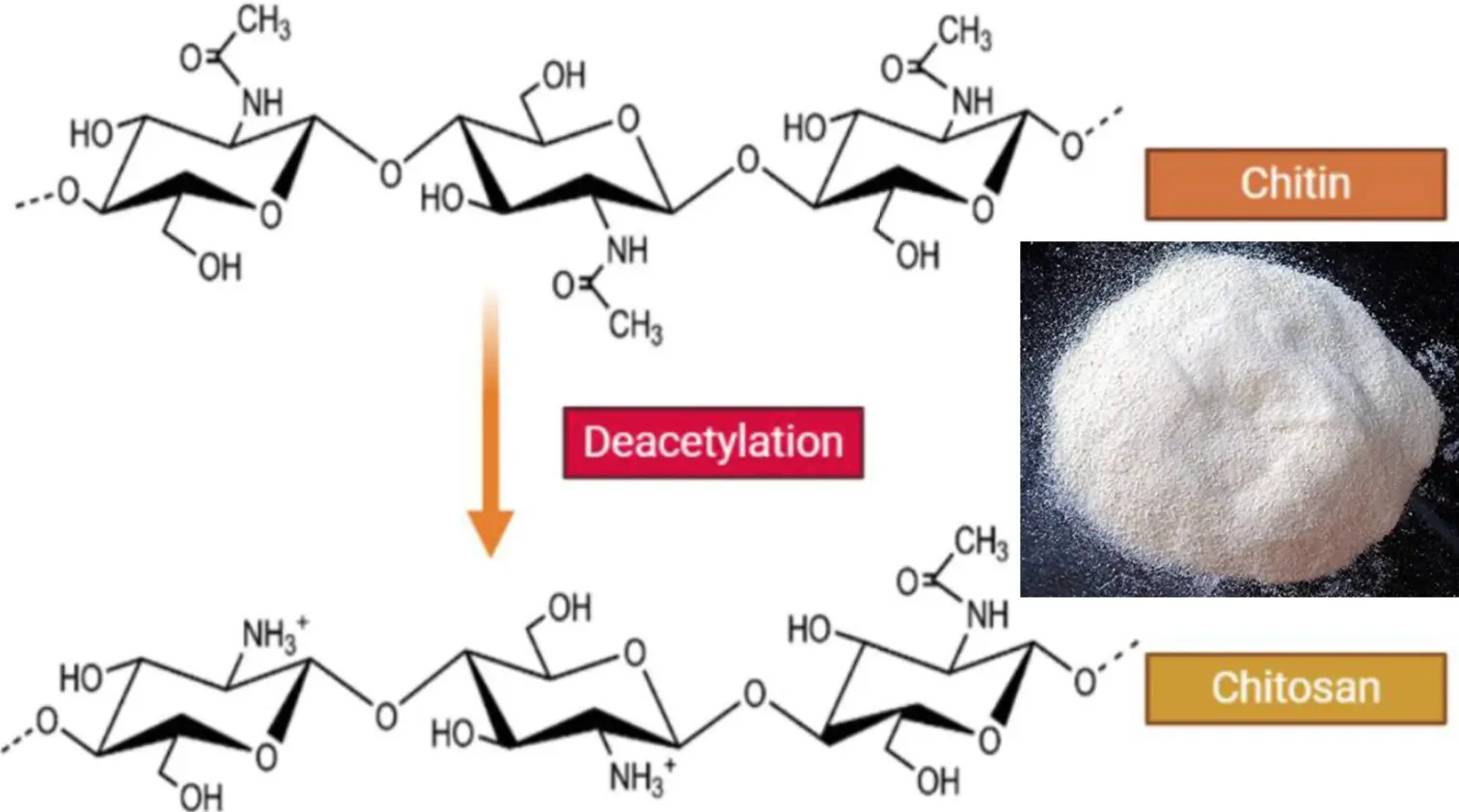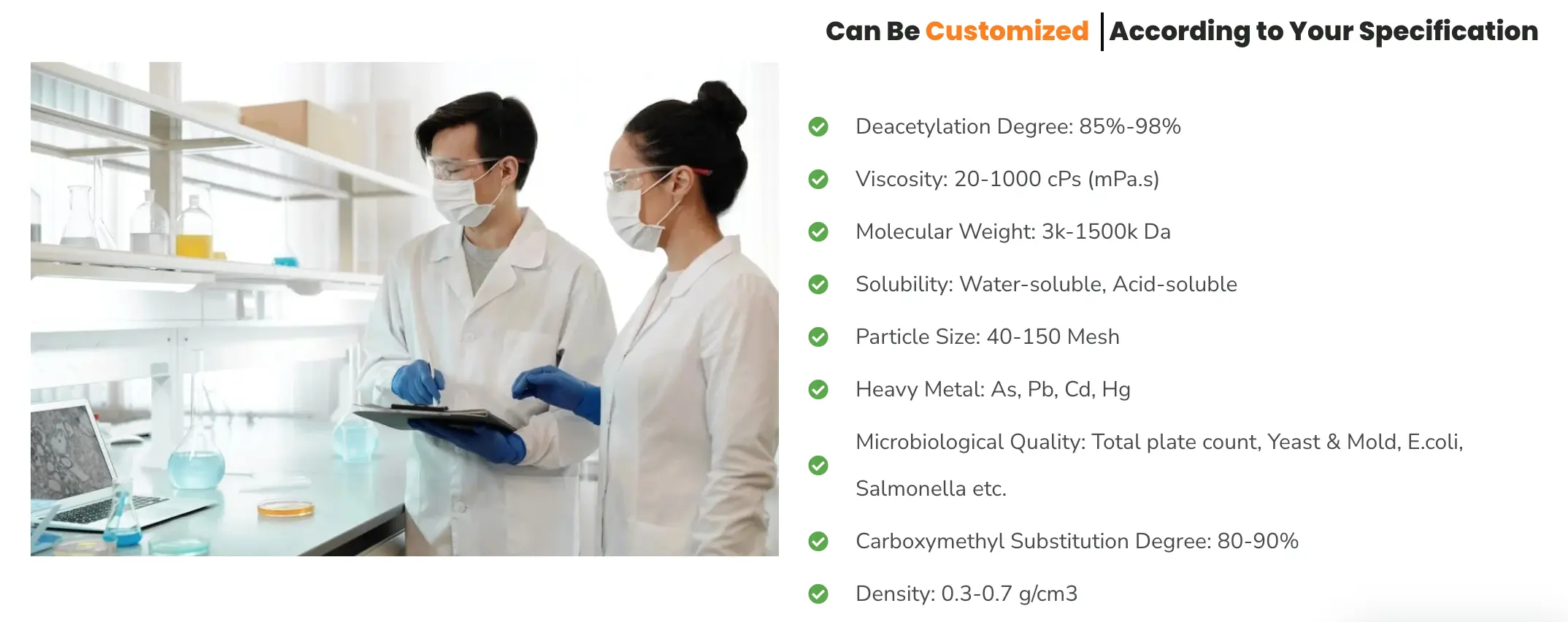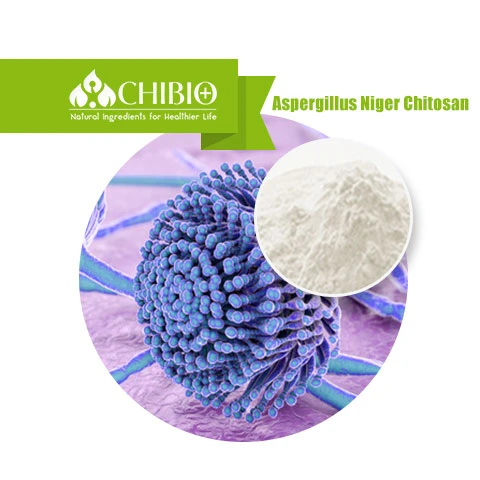Aspergillus Niger Chitosan
Aspergillus Niger Chitosan
Additional information
| Product Name | Aspergillus Niger Chitosan |
|---|---|
| Form | Off-white to light yellow powder |
| Source | Aspergillus Niger (Corncob Fermentation) |
| Cas No. | 9012-76-4 |
| Specification | Acid-soluble & Water-soluble |
| Main Application | Wine Fining Agent, Dietary Supplement for Fat Binder, Food, Cosmetics, etc |
Product Details

Aspergillus Niger Chitosan – High-Quality Fungal-Derived Chitosan
What is Aspergillus Niger Chitosan?
Aspergillus Niger Chitosan is a specialized form of chitosan derived from the fungal species Aspergillus niger. Unlike traditional chitosan, which is typically sourced from crustacean shells, this fungal-derived chitosan is fully plant-based, making it an excellent option for vegetarians, vegans, and individuals with shellfish allergies. It is known for its high purity, biocompatibility, and versatile applications across various industries.
CAS Number:
- CAS No.: 9012-76-4 (general chitosan CAS number)
Chemical Structure:
- Chemical Formula: (C6H11NO4)n(C_6H_{11}NO_4)_n(C6H11NO4)n
- The chemical structure of Aspergillus Niger Chitosan consists of D-glucosamine units linked by β-(1→4) glycosidic bonds. The acid-soluble form is optimized for dissolution in acidic environments, enhancing its functionality in various applications.
The repeating unit can be represented as:
- [–(C_8H_{15}NO_5)–]n
Where “n” represents the degree of polymerization.

Specification
We offer a wide range of grades and specifications for Aspergillus Niger Chitosan to meet your specific requirements. Whether you need a particular viscosity, degree of deacetylation, or solubility profile(acid-soluble or water-soluble), we can customize our product to align with your exact needs. Our technical team is ready to collaborate on tailored solutions that drive your business forward.
- Appearance: Off-white to light yellow powder
- Degree of Deacetylation: Typically ≥ 98%
- Molecular Weight: Variable, often around 20,000 Da
- Solubility: Soluble in acidic solutions or water

Here below are the regular types of aspergillus niger chitosan:
- GBS006: Acid-soluble Aspergillus Niger Chitosan (with viscosity 20 cps (mpa.s) / 20kDa)
- GBS007: Water-soluble Aspergillus Niger Chitosan Hydrochloride (with viscosity 20 cps (mpa.s)/20kDa)
- GBS008: Water-soluble Aspergillus Niger Chitosan Oligosaccharide (≤5Kda)
- GBS009: Acid-soluble Aspergillus Niger Chitosan (High Density ≥0.7g/ml with viscosity 20 cps (mpa.s) / 20kDa)

This table illustrates a direct correlation between the viscosity and molecular weight of chitosan, where higher molecular weights result in increased viscosity.
This relationship is crucial for selecting the appropriate chitosan grade for various applications, as higher viscosity chitosan, due to its larger molecular structure, is ideal for creating thicker gels and films.
Additionally, the degree of deacetylation influences this relationship, further refining the material’s suitability for specific industrial uses.
Solubility
Aspergillus Niger Chitosan is specially formulated to dissolve easily in dilute acidic or water solutions, typically at a 1% solubility ratio, making it ideal for applications requiring a stable, water or acid-soluble polymer. Its high solubility ensures efficient performance in various formulations.

Kindly watch the videos of solubility of different types of vegetal chitosan: https://www.chibiotech.com/video/
Specification Customized Service
At Chibio, We offer customized Aspergillus Niger Chitosan solutions to meet your specific needs, including adjustments to molecular weight, degree of deacetylation, and other properties, ensuring optimal performance for your intended application.

Advantages & Benefits
- Vegan and Non-Allergenic: Sourced from fungi, it is suitable for individuals with dietary restrictions or shellfish allergies.
- High Purity: Provides a clean, consistent product free from animal derivatives.
- Eco-Friendly: Sustainable production processes minimize environmental impact.
- Biocompatible: Safe for use in medical, pharmaceutical, and cosmetic applications.

Functions
- Antimicrobial Activity: Inhibits bacterial and fungal growth, making it ideal for applications in food preservation and wound care.
- Film Formation: Forms strong, flexible films suitable for coatings, packaging, and drug delivery systems.
- Biodegradability: Environmentally friendly, breaking down naturally without harming ecosystems.
- Immune Boosting: Enhances immune function when used in dietary supplements and health products.

Main Applications (More about applications)
- Wine Fining Agent: Enhances clarity and stability in wine by removing sediments and impurities, improving the overall quality.
- Dietary Supplement for Fat Binder: Acts as a fat binder in dietary supplements, aiding in weight management.
- Blood Cholesterol Reduction: Supports the reduction of blood cholesterol levels when used in dietary supplements.
- Bandages and Sponges: Utilized in medical bandages and sponges for its excellent biocompatibility and wound healing properties.
- Dental Health: Incorporated in dental care products for its antimicrobial properties and ability to improve oral hygiene.
- Pharmaceuticals: Used in drug delivery systems and as a stabilizer in various formulations.
- Cosmetics: Enhances moisturization and provides skin protection in lotions, creams, and gels.


Flowchart
The production process of Aspergillus Niger Chitosan involves cultivating the fungal strain, extracting and purifying chitosan, and then processing it through various stages to ensure high purity and functionality.

The flowchart of aspergillus niger chitosan outlines the process for extracting chitosan from Aspergillus niger, a type of fungus. Here’s a step-by-step summary of the key points:
- Starting Material: Aspergillus niger is cultured through a fermentation process using corn.
- Extraction:
- The fungal biomass undergoes a bulk flocculation.
- This is followed by centrifugation to separate the components.
- The pH of the resulting material is adjusted to alkaline conditions (pH 8-10).
- Another round of centrifugation and isolation occurs.
- The pH is adjusted back to neutral (pH 7), and the sediment is washed and precipitated.
- The sediment is then extracted with 5% acetic acid at 100°C for five hours to get the clear solution.
- It is washed again to achieve a clear solution with a neutral pH.
- Chitin Production:
- The clear solution is treated with 7% sodium hydroxide (NaOH) at a ratio of 1:10 (W/V) at 50°C for three hours.
- Centrifugal washing follows, resulting in the production of chitin as a clear solution to get the sediment.
- Deacetylation:
- The sediment undergoes the deacetylation process. It’s treated with 20% NaOH at a ratio of 1:10 (W/V) and heated in a microwave at 480W for 15 minutes.
- This step is crucial to convert chitin into chitosan by removing acetyl groups.
- Final Steps:
- The final sediment, which is now deacetylated chitin or chitosan, is extracted.
- It undergoes drying, followed by sieving to achieve the desired particle size.
- End Product: The final product is solid Aspergillus niger chitosan.
This process includes several steps involving pH adjustment, centrifugation, chemical treatments, and heating, which are critical to ensuring the purity and quality of the chitosan extracted from Aspergillus niger.
Why Choose Us? (More about us)
- Expertise: With over 8 years of experience, Chibio Biotech is a trusted leader in producing high-quality vegetal chitosan, including fungal-derived varieties.
- Certified Quality: Our products are ISO 22000:2018, Halal, Kosher, and Organic certified, ensuring adherence to the highest industry standards. (>>See more about our certificates)
- Customized Solutions: We offer tailored chitosan solutions to meet your specific needs, ensuring the best performance for your applications.
- Global Reach: Serving customers in over 50 countries, we have the expertise and capacity to support your business wherever you are.
Why your businesses consider using vegetal chitosan?
Using vegetal chitosan in your applications or formulations offers significant benefits to businesses, as outlined below:
- Eco-Friendly and Sustainable: Vegetal chitosan is derived from plant sources such as mushrooms and fungi, making it an environmentally sustainable alternative to traditional animal-based chitosan. This aligns with growing consumer demand for green and eco-friendly products.
- Non-Allergenic and Vegan-Friendly: Unlike crustacean-derived chitosan, vegetal chitosan does not trigger shellfish allergies and is suitable for vegan and vegetarian consumers. This widens the market reach for products formulated with vegetal chitosan.
- Versatility and Superior Functionality: Vegetal chitosan offers excellent biocompatibility, biodegradability, and antimicrobial properties. These attributes enhance its utility across various industries, including food, pharmaceuticals, cosmetics, textiles, and agriculture.
- Enhanced Product Performance: In many applications, vegetal chitosan improves product qualities such as moisture retention, antimicrobial efficacy, and barrier properties. This leads to better-performing end products, such as longer shelf-life for food items or improved durability and functionality in textiles.
- Market Differentiation: Incorporating vegetal chitosan allows companies to differentiate their products by promoting natural, sustainable, and allergen-free claims, which are increasingly valued by health-conscious and environmentally aware consumers.
In summary, using vegetal chitosan can help your businesses enhance their product offerings, meet consumer demands for sustainable and non-allergenic ingredients, and improve your overall market positioning.
Discover the benefits of Aspergillus Niger Chitosan today! Contact us for more details or to request COA and a custom quote.
Get in touch with us to boost your business

- Get Free Sample
- Get Step Quote
- 24/7 Service
- Customized Specification
- Confidentiality Agreement
Headquarter
Block B, Vanke Center, No.2 Heilongjiang South Road, Shibei District, Qingdao City, China 266033
Phone
+86 (0)532 66983270
Cellphone / WhatsApp / WeChat
+86 156 6577 2296
+86 133 8100 5417




